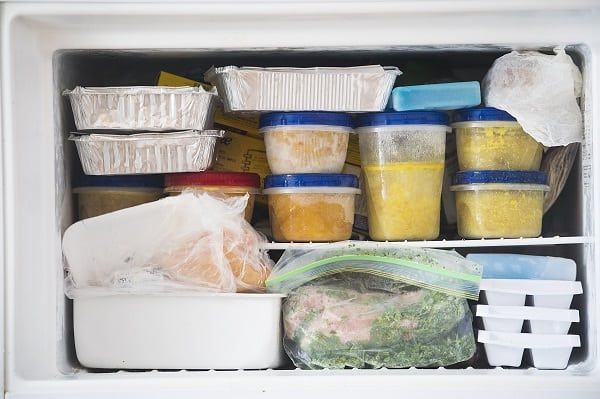What Foods Shouldn’t Be Frozen? Avoid These 6 Items.
While your freezer can be an asset when preserving food, there are some items that should never feel its icy chill. What foods shouldn’t be frozen? Produce with high water content, like watermelon, lettuce or cucumbers, become mushy when defrosted. Learn more foods you should never freeze to maintain their taste and texture and even your safety.
Freezer Facts: What Foods Shouldn’t Be Frozen.
Why are some foods not suitable for freezing? Most of the time, the freezing or defrosting process alters its texture, making it unpalatable. However, some foods are more prone to bacterial growth when frozen and defrosted, increasing your chance of food-borne illness. Here’s a list of what foods shouldn’t be frozen to avoid more than just an unpleasant bite.

1. Dairy Products
Can you put milk in the freezer? Not if you expect it to look the same. Freezing separates the milk’s fat from its liquid, resulting in a lumpy, curdled mess. Other dairy products, like cheese and yoghurt, will undergo the same change, permanently altering their consistency. Our refrigerator organization tips recommend storing cheese on covered door shelves for slightly warmer temps that better preserve its flavour.
What about eggs? While cooked eggs may look the same when defrosted, they often have an unpleasant, rubbery texture. Meanwhile, freezing an egg in its shell can cause it to crack, inviting in bacteria. To freeze eggs safely and maintain their texture, thoroughly whisk raw egg and store it in an airtight container.
2. Fully Cooked Pasta
Can you freeze pasta without affecting its taste and texture? Unfortunately, plain frozen pasta typically turns mushy and tasteless when defrosted. However, baked pasta dishes, like lasagna and baked ziti, fare better when baked and frozen. For best results, cook the pasta al dente before freezing and reheating.
3. Meat That’s Been Defrosted
Can you refreeze defrosted meat? This is a clearcut cooking no-no. While freezing meat once is fine, freezing it again after it’s been defrosted can preserve any bacteria that developed during the defrosting process. When freezing large amounts of meat, portion it out into smaller servings that can be used for a single meal. To reduce the risk of bacterial growth, defrost meat in the refrigerator and only when it’s intended for use within 48 hours.
4. Potatoes
Like other produce with a high water content, potatoes are foods you shouldn’t put in the freezer. Freezing will separate the potato’s starch and water, leaving it lumpy and mushy upon defrosting. If you need to freeze potatoes, cook them first, as doing so makes the texture change less noticeable. Freezing potatoes when they’re part of a larger dish, like a casserole or stew, further disguises any textural changes.
5. Leafy, Green Herbs
Once again, the higher the water content, the more soggy a food will be when defrosted. Leafy, green herbs top the list of what foods shouldn’t be frozen, as freezing permanently alters their consistency, leaving them mushy and flavorless.To successfully freeze fresh herbs, chop and portion them into an ice cube tray before covering them with olive oil and freezing. The oil better preserves the herbs’ texture once defrosted, while the cubes allow you to only use what you need for each meal.
6. Coffee
What foods shouldn’t be frozen despite what you may have heard? Coffee should never be stored in the freezer. The cold temperatures deplete both whole beans and grounds of not only their flavor, but their pleasing aroma. Coffee beans and grounds are best stored in an airtight container at room temperature, away from excessive heat, cold or light. When stored in this way, it can last for 2-4 weeks without its flavor or aroma being altered.
Are warm freezer temps preventing you from freezing anything properly? It may be time for a freezer repair service to have a look. Schedule your expert repair with Reliable Appliance Service today!

